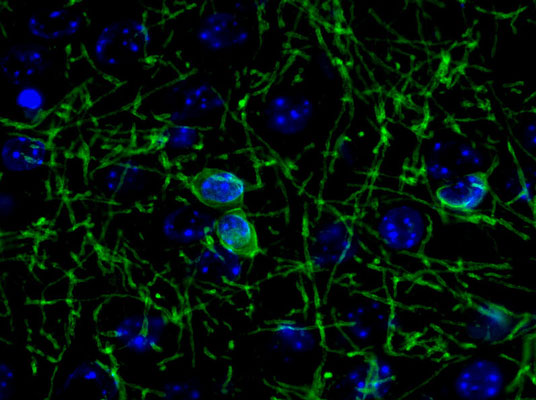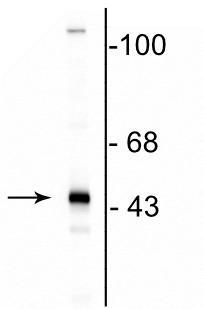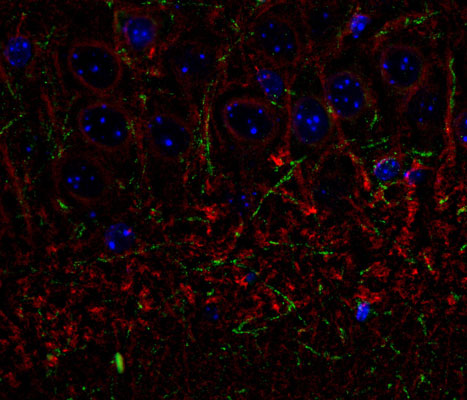Anti-CNP (2,3-cyclic nucleotide-3-phosphodiesterase) Antibody
Our Anti-CNP (2,3-cyclic nucleotide-3-phosphodiesterase) primary antibody from PhosphoSolutions is r
- SPECIFICATION
- CITATIONS
- PROTOCOLS
- BACKGROUND

Application
| WB |
|---|---|
| Primary Accession | P13233 |
| Reactivity | Bovine, Chicken, Drosophila |
| Host | Rabbit |
| Clonality | Polyclonal |
| Isotype | IgG |
| Calculated MW | 47268 Da |
| Gene ID | 25275 |
|---|---|
| Other Names | 2'' antibody, 2'3' cyclic nucleotide 3' phosphodiesterase antibody, 3''-cyclic-nucleotide 3''-phosphodiesterase antibody, CN37_HUMAN antibody, CNP 1 antibody, CNP antibody, CNP1 antibody, CNPase antibody |
| Target/Specificity | 2,3-cyclic nucleotide-3-phosphodiesterase (CNP) is a membrane bound, microtubule associated protein that is among the most abundant myelin proteins of the CNS. It is thought that CNP may serve as a regulator of tubulin polymerization and of microtubule distribution (Bifulco et al., 2002). It was recently found that CNP may also function as a possible linker protein anchoring microtubules to the plasma membrane via a 13 residue C-terminal CNP fragment (Bifulco et al., 2002, Esposito et al., 2008). |
| Dilution | WB~~1:1000 |
| Format | Neat serum |
| Storage | Maintain refrigerated at 2-8°C for up to 6 months. For long term storage store at -20°C in small aliquots to prevent freeze-thaw cycles. |
| Precautions | Anti-CNP (2,3-cyclic nucleotide-3-phosphodiesterase) Antibody is for research use only and not for use in diagnostic or therapeutic procedures. |
| Shipping | Blue Ice |

Thousands of laboratories across the world have published research that depended on the performance of antibodies from Abcepta to advance their research. Check out links to articles that cite our products in major peer-reviewed journals, organized by research category.
info@abcepta.com, and receive a free "I Love Antibodies" mug.
Provided below are standard protocols that you may find useful for product applications.
Background
2,3-cyclic nucleotide-3-phosphodiesterase (CNP) is a membrane bound, microtubule associated protein that is among the most abundant myelin proteins of the CNS. It is thought that CNP may serve as a regulator of tubulin polymerization and of microtubule distribution (Bifulco et al., 2002). It was recently found that CNP may also function as a possible linker protein anchoring microtubules to the plasma membrane via a 13 residue C-terminal CNP fragment (Bifulco et al., 2002, Esposito et al., 2008).
If you have used an Abcepta product and would like to share how it has performed, please click on the "Submit Review" button and provide the requested information. Our staff will examine and post your review and contact you if needed.
If you have any additional inquiries please email technical services at tech@abcepta.com.













 Foundational characteristics of cancer include proliferation, angiogenesis, migration, evasion of apoptosis, and cellular immortality. Find key markers for these cellular processes and antibodies to detect them.
Foundational characteristics of cancer include proliferation, angiogenesis, migration, evasion of apoptosis, and cellular immortality. Find key markers for these cellular processes and antibodies to detect them. The SUMOplot™ Analysis Program predicts and scores sumoylation sites in your protein. SUMOylation is a post-translational modification involved in various cellular processes, such as nuclear-cytosolic transport, transcriptional regulation, apoptosis, protein stability, response to stress, and progression through the cell cycle.
The SUMOplot™ Analysis Program predicts and scores sumoylation sites in your protein. SUMOylation is a post-translational modification involved in various cellular processes, such as nuclear-cytosolic transport, transcriptional regulation, apoptosis, protein stability, response to stress, and progression through the cell cycle. The Autophagy Receptor Motif Plotter predicts and scores autophagy receptor binding sites in your protein. Identifying proteins connected to this pathway is critical to understanding the role of autophagy in physiological as well as pathological processes such as development, differentiation, neurodegenerative diseases, stress, infection, and cancer.
The Autophagy Receptor Motif Plotter predicts and scores autophagy receptor binding sites in your protein. Identifying proteins connected to this pathway is critical to understanding the role of autophagy in physiological as well as pathological processes such as development, differentiation, neurodegenerative diseases, stress, infection, and cancer.




